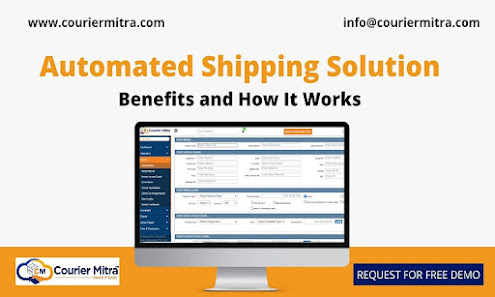Automated Shipping: Benefits and How It Works
Automation is all around us, and as technology advances, more and more forms of it will emerge. Automation, at its most basic level, streamlines tasks so that we have less labor to do and/or may spend less time on mundane tasks. This philosophy of "set it and forget it" is intended to make the boring automatic.
Automating key procedures as a company expands allows it to scale to meet the changing needs of its consumers. Because there isn't a big volume of orders currently, small and medium firms can get away with some manual operations. Simultaneously, shipping automation solutions possible early on can assist organizations in growing more quickly. Although there is a bigger initial investment, it can pay off in the long run.
What is automated shipping?
The
automation of commercial shipping procedures as new orders are placed,
including picking things from inventory, packing boxes, and getting packages in
transit to be delivered to clients, is known as automated shipping.
In
the world of fulfillment, quickness will put you ahead of the pack. An
automated shipping solution's goal is to put orders that need to be completed
in a queue automatically, eliminating some of the manual work. It might be as
elaborate as using robots, or as basic as adding a layer of software or putting
in infrastructure like conveyor belts.
Accelerating growth with automated shipping
Shipping
processes that are automated encourage higher efficiency, which leads to
increased output. As a result, businesses may fulfill a greater number of
orders and/or process them more quickly. As a result, automated shipping helps
in the optimization of your supply chain. Let's take a look at the specific
advantages that automated shipping
solution can provide for businesses.
Resource utilization
In
shipping procedures, automation drastically decreases the requirement for human
intervention. This is because automated tools can handle duties like order
verification and shipping label development and printing. As a result, business
owners will require less labor and will be able to reassign team members to
non-automated roles.
For
eCommerce firms that process hundreds of orders or more every month, automated
shipping can be extremely beneficial.
Spend less money
In
the case of Automation shipping, since less manpower is needed, business owners
can spend more time on the most critical tasks that only they can handle. You
might think it is counterintuitive to pay someone else to do something you can
do for free, but it turns out handling shipping yourself has a number of hidden
costs.
Efficiency
Automated
shipping systems allow for significantly faster turnaround times. With
technology, you can automate many time-consuming tasks, such as packing,
adhering to shipping labels, and sorting or counting stock levels. By
streamlining your shipping process, you can increase production, serving more
customers in less time. Ultimately, this helps you increase sales and profits.
Supply chain optimization
By
automating your shipping process, you can consolidate all of your data into one
place. As a result, you can track and manage orders and inventory better, and
even improve demand forecasting.
Sum Up - Having an automated shipping solution can
help save money in the long run. The system is designed to enable growth and
keep shipping costs low. With automation, business decisions can be based on
solid data. This can help ensure that a company’s growth isn’t stunted by
shipping costs. Of course, automation requires the software to back it up. This
is especially true for eCommerce merchants who have complex logistical
requirements for their business. In this article, we are discussing some
important topics about automated shipping solutions and their benefits. Courier Mitra a courier aggregator
software for your business that helps your small or medium courier business.

.png)
.jpg)
Comments
Post a Comment